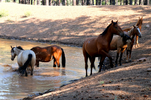Bald Eagle
Haliaeetus leucocephalus

Bring binoculars to lakes and rivers, best seen fishing or perched on snags
The bald eagle is a large, iconic bird of prey and a national symbol of the United States, commonly found near lakes, rivers, and reservoirs in Arizona. Recognizable by its white head and tail contrasting with a dark brown body and wings, this powerful raptor feeds primarily on fish but will also scavenge carrion and hunt small mammals. Bald eagles build large nests in tall trees or on cliffs near water, often returning to the same nesting site year after year. Their presence indicates healthy aquatic ecosystems, and sightings of a soaring bald eagle over Arizona’s waterways provide memorable wildlife experiences for observers. As top predators, bald eagles play an important role in maintaining ecological balance while inspiring awe and appreciation for the natural world.
Bird

Identification & Behavior
Key Features: White head and tail, dark brown body, yellow beak and talons
Size: 7–12 lbs; wingspan 6–7.5 ft
Behavior: Soars over water looking for fish; nests in tall trees and cliffs
Diet: Carnivore – fish, waterfowl, carrion
Activity Pattern: Diurnal
Habitat & Distribution
Found statewide, primarily near lakes, rivers, and reservoirs such as the Salt River, Verde River, Colorado River, Lake Powell, Lake Mead, and Roosevelt Lake. Habitat includes desert rivers, grasslands, forested highlands, and riparian corridors. Frequently observed along the Mogollon Rim, White Mountains, and Verde River canyonlands. Present in Coconino, Apache-Sitgreaves, Tonto, and Kaibab National Forests, especially during winter migration.
Elevation Range: 2000–9000 ft
Seasonal Presence: Year-round, higher concentrations in winter
Risks & Management
Stay 100 yards away from nests; never disturb feeding or roosting eagles




































